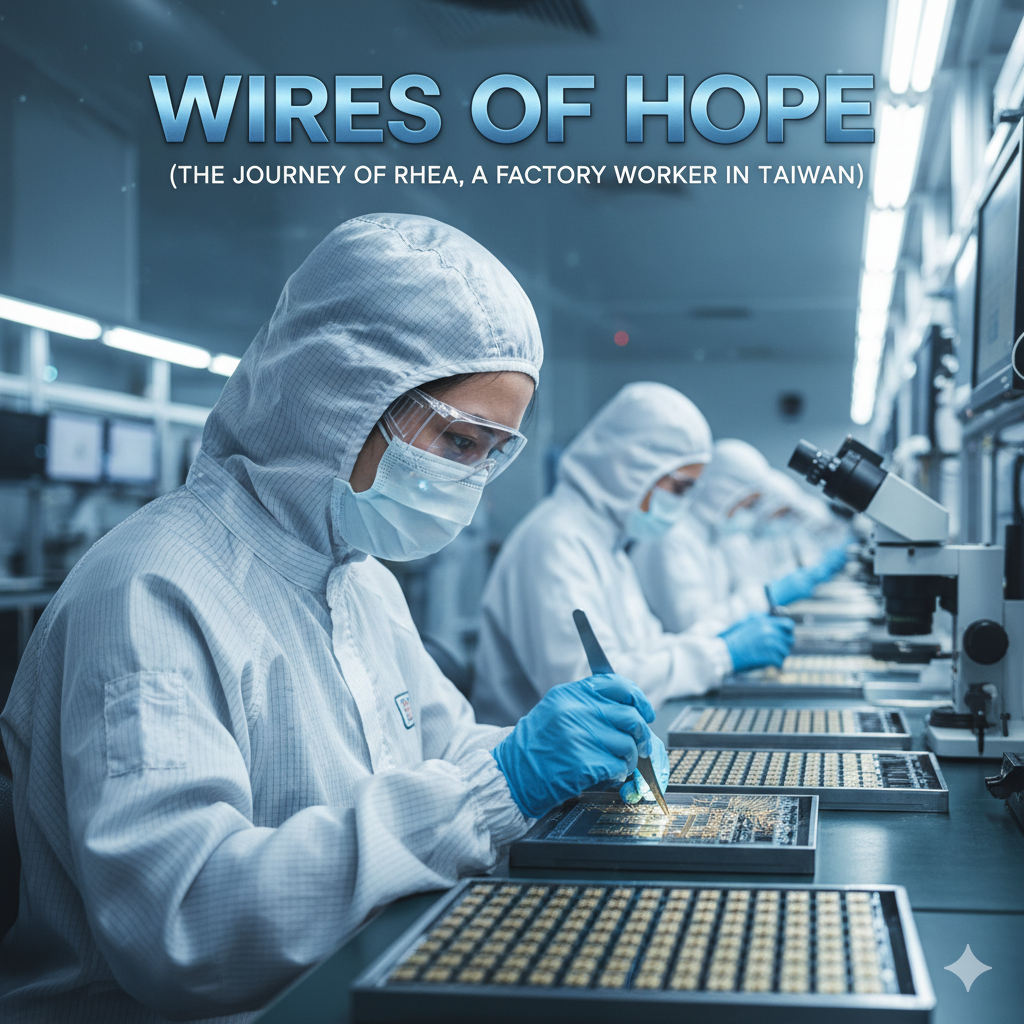The buzzing sound of machines filled the air as Rhea Santos stood in her workstation, carefully assembling microchips one by one. The factory floor was bright, sterile, and endlessly busy a world of precision and speed. For most people, it was just a job. But for Rhea, it was her lifeline the thread connecting her sacrifices in Taiwan to her family’s dreams back home in the Philippines.
Rhea was 29 when she first left her hometown in Laguna. Her family had always struggled to make ends meet. Her father, a tricycle driver, suffered from diabetes, and her mother sold vegetables in the market. After college, Rhea worked in a small electronics company, but the pay was barely enough to cover her sibling’s tuition. She often caught herself staring at her mother’s tired hands and thinking. There must be more I can do.
So when her friend told her about an opportunity to work in Taiwan as a factory operator, she grabbed it even if it meant leaving everything she loved behind.
Rhea’s first impression of Taiwan was how clean and organized everything was. The streets were lined with scooters, neon signs glowed in the night, and the people moved quickly but politely. The agency arranged her stay in a dormitory near the factory in Taichung, along with other Filipino workers.
Her first week at the electronics factory was overwhelming. The machines were massive, the instructions were in Mandarin, and the pressure was constant. They had quotas to meet, quality checks to pass, and strict supervisors who expected efficiency.
She worked from 7 am to 7 pm., standing for long hours, her hands moving mechanically but carefully. Every mistake meant wasted materials and sometimes, deductions from her pay. During breaks, she would sit quietly, sipping milk tea while thinking of her family.
Her roommate, Liza, another Filipina, would often cheer her up. “Don’t worry, Rhea,” she’d say with a grin. “After a few months, you’ll move like a robot fast and smooth!”
They laughed, and somehow, that made the long hours easier.
Every month, Rhea sent part of her salary home. Her mother always messaged her, “Anak, we received the money. Thank you. You father’s medicines are covered.”
Those words gave Rhea strength. She knew her sacrifices mattered. Still, homesickness crept in at night the quiet moments after work when she lay om her bunk bed staring at the ceiling. She missed the smell of adobo, the laughter of her siblings, and the sound of rain on the tin roof of their small house.
On Sundays, her only day off, she’d video call her family. “Ma, how’s Papa?” “He’s better, anak. He smiles every time he sees your remittance.” “And the twins?” “Still noisy! But the miss their Ate.”
Rhea smiled through tears. Those video calls became her medicine the one thing that reminded her why she endured twelve-hour shifts and aching legs.
The factory was massive producing electronic components for gadgets and machines shipped across the world. Inside, everything had to be exact. Workers wore white uniform, hairnets, and mask. The temperature was always cold to keep the machines from overheating.
Rhea’s job was in the quality control section, checking microchips under a magnifying glass. Her eyes often hurt, and her back ached, but she refused to complain. Her supervisor noticed her dedication.
“Rhea, you’re one of our most careful workers,” he said one day. “Would you like to train new hires?”
That small recognition lit up her heart. It wasn’t a big promotion, but it meant she was trusted. She trained newcomers including other Filipinos, Indonesians, and Vietnamese teaching them how to spot defective parts. She even learned basic Mandarin to communicate better.
Her confidence grew, and so did her pride. “Maybe I’m not an engineer,” she thought one night, “but I’m part of something big.”
After two years, Rhea had saved enough to renovate their home. Her family replaced the old roof, bought a refrigerator, and even started a small sari-sari store. Every payday, Rhea would smile as she sent money, knowing she was slowly changing their lives.
But behind her smiles, there was exhaustion. The long hours, the repetitive work, and the isolation took their toll. There were times she wanted to quit, pack her bags, and go home.
One rainy night, after a particularly grueling shift, Rhea broke down. “I’m so tire,” she whispered, tears falling silently. “I just want to rest.”
her roommate Liza hugged her. “We all get tired, Rhea. But remember we’re doing this not just for money, but for love. Every wire you solder, every chip you check, it’s part of your family’s future.”
Those words stayed with her.
In her third year, Rhea applied for renewal and was accepted. Her employer even gave her a small raise. With that, she enrolled her younger sister in college something she’d always dreamed of.
One day, while working, her phone buzzed with a message:
“Ate, I passed my board exam! I’m now a licensed teacher!
Rhea froze, her heart pounding. Tears welled up in her eyes as she looked around the factory the noise of machines humming like music to her ears. She whispered, “All of this was worth it.”
That night, she treated her dormmates to dinner. They laughed, shared stories, and sang karaoke songs that reminded them of home. For a moment, they weren’t just workers they were dreamers celebrating victory far from home.
After six long years in Taiwan, Rhea decided to return to the Philippines. She had saved enough to build a small computer and electronics repair shop beside their house using everything she learned in the factory. Her sister helped her manage it while Rhea offered basic electronics repair services.
The first morning she opened her shop, the smell of coffee and the sound of tricycles filled the air. Her father, now healthier, sat outside smiling proudly. “Anak, you did it,” he said.
Rhea looked up at the sunrise, “We did it, Pa.”
Today, Rhea often visits schools to speak about her experience as an OFW. “Being an OFW isn’t easy,” she tells young people. “You’ll feel lonely, tired, and homesick. But you’ll also learn strength, discipline, and faith,”
She reminds them that success doesn’t always come from comfort – sometimes, it grows from sacrifice.
At night, when she locks her small shop and watches the lights flicker, Rhea smiles. The machines of Taiwan may be far away, but their hum still echoes in her heart a reminder that every wire she touched once carried her family’s dreams.
Her story is proof that even in the coldest factories, hope burns bright especially when powered by the heart of a Filipino.



